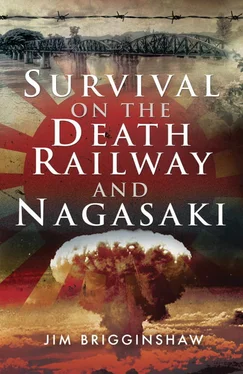The winches, used to lower skips into the hole and haul them out when filled with earth, stood on solid ground on the edge of the excavation. The winch drivers would not be going down into the hole. That was enough for Tellemalie. He held up his hand.
‘You Number One steam winch driver?’ the Japanese engineer asked.
‘Bloody oath. Drove ’em for years at sugar mills’, Tellemalie lied. He’d never even been close to one. He pointed to Jim. ‘Me mate here Number One steam winch driver too. We work together.’
Bodero hissed in his ear. ‘We don’t know a thing about steam winches.’
‘Do you want to go down that bloody hole?’
Jim shut up.
If the number of prisoners who had their hand up was any indication, Australia was a nation of steam winch drivers. Each man was asked by a Japanese officer if he was a Number One steam winch driver. They all were.
The Japanese engineer, obviously impressed by the abundance of technical knowledge of steam winches in Australia, quickly filled his quota. ‘Oosh!’ he said, waving them to their machines.
‘Tellemalie, we’re dead meat’, Jim moaned when he saw the mechanical monster they were to operate. ‘When the Nips find out we know bugger-all about steam winch driving, they’ll shoot us for sure and throw us down in the mud with the rest of the bodies.’
The winch was a huge contraption belching steam. At the rear of the driver’s cab was a steel drum around which was wound a thick wire hawser that hung over the edge of the excavation and disappeared into its depths.
Tellemalie was walking around the mysterious machinery, trying to look as if he knew something about it, when from up in the cab came a voice. ‘You the relief driver?’ It was a British prisoner who had been driving the winch on the night shift. The work went on twenty-four hours a day.
Tellemalie nodded dumbly, and the winch driver left his seat. ‘All yours’, he said. ‘I’ve left the steam on, she’s all ready to go.’ Before he could be asked how the thing worked, he’d disappeared.
The two men, wondering where to start, were stirred into action by a torrent of abuse from a Japanese guard who was waving his arms around and demanding work from his new winch drivers.
Tellemalie nudged Jim forward. ‘After you.’
‘Why me?’
‘You look like a steam winch driver.’
‘Thanks, mate.’ Jim climbed up and looked around for some means of controlling the thing. He yanked hard at a long lever. There was a loud whooshing sound and a string of loaded skips shot up out of the depths of the excavation. The drum behind the driver’s cab whirled and screamed as it hauled in the wire rope.
Jim panicked and pushed the lever forward-hard. Just as quickly as they’d emerged from the hole, the full skips now disappeared back into it. From down below came crashing noises and frightened yells.
The Japanese guard ran at Jim and Tellemalie waving an iron bar. It was a scene that could have come from a Keystone Kops movie-two men being chased around the winch by a third waving an iron bar and yelling unintelligible abuse.
It ended when the guard couldn’t catch them and threw the iron bar in frustration. It missed, and he strode off mumbling what were probably Japanese obscenities.
‘I think he’s pleased with us, mate’, Tellemalie grinned. ‘You got those bloody wagons up and back real fast. There’s not much to this winch driving.’
‘Then why don’t you have a crack at it?’
‘Me, I’m the signalman. You need someone experienced at giving signals if you’re going to keep dropping wagons on the poor buggers down in the hole.’
Jim climbed back into the cab. Now that he knew which way to pull the lever, he tried it again, but not with a wild jerk this time, far more gently. The string of full skips rose out of the hole sedately.
Jim poked out his skinny chest at his success. When the skips were emptied and pushed to the edge of the pit, he applied gentle pressure to the lever and they were lowered over the side.
‘What a bloody soft touch’, Tellemalie said. ‘I think I’ll have a go.’
‘I thought you were the signalman.’
‘In jobs such as this, we should both be proficient.’
Jim sighed and climbed down. Tellemalie took over the controls, crouching over them like a buckjump rider waiting to be turned loose from the chute. He furthered the impression by turning up the brim of his hat, cowboy style. It was the same Dutch army straw hat he’d waved at Tavoy when he was inviting Japanese planes to crash.
It wasn’t long before Tellemalie got the hang of it. From then on, he monopolised the job and became known as the cowboy winch driver.
He enjoyed himself until the day signalman Jim was standing beside a line of skips waving for them to be lowered into the pit when he pushed the lever and nothing happened. The skips didn’t move.
The inaction soon had a Japanese guard jumping up and down screaming, ‘Buggaroo! Buggaroo! Dame, dame!’
Tellemalie had never taken the trouble to learn any of the Japanese language, but he could see that the guard wasn’t complimenting him.
‘What’s wrong with this bastard, Jim?’ he called.
Before Jim could answer, the Jap started heaving rocks at them. It was enough for Tellemalie to desert his post and take refuge behind the winch. When he did, he saw why the skips wouldn’t move. The wire rope had jumped off the drum, and coils of it were threshing about on the ground.
Tellemalie held up a hand like a traffic cop and pointed to the trouble. The guard stopped throwing rocks, the rope was put back on the drum and work began again.
However, nobody threw rocks and iron bars at Tellemalie and got away with it, so he began to engage in acts of sabotage as a means of getting his own back. He had Jim unhook the empty wagons as they were being lowered over the edge of the pit. The wagons would tumble into the hole and become a tangled pile of metal and wood at the bottom. Prisoners down in the hole waiting to fill the wagons were always warned beforehand and kept out of the way, but they played along, running about and screaming as if in mortal danger.
The guards eventually woke up to what was happening and handed out so many beatings that this form of sabotage had to be abandoned. Now Tellemalie started calling them lurid names to their faces. He figured that if he couldn’t understand their language, they couldn’t understand his, but soon found that he was mistaken.
The Japanese head engineer was sitting in his cane chair in the shade of an umbrella shouting instructions to the British prisoners working down below. The Brits couldn’t understand a word of it. From the depths of the hole came voices calling him all the foul names they could think of.
The engineer turned to Bodero, who stood nearby, and said in perfect English, ‘Those men are making it very difficult for themselves.’
From then on, Tellemalie was more careful when the engineers were around.
Queenslanders Chilla Goodchap and Ronnie Crick, sailors from HMAS Perth , found themselves a rare cushy job on the dry dock project. A Japanese engineer put them in charge of his personal supply of hot water.
Chilla and Ronnie had some experience with hot water. They’d swum in it when the Perth, along with the USS Houston, had been sunk in the Java battle and the sea was on fire with burning oil.
In their job as bath attendants they were required to have a huge drum of water ready at the right temperature for the engineer at the end of the day.
Chilla and Ronnie knew their job was a sinecure and, anxious to hold on to it, they never failed to have the bath ready for the engineer. He’d arrive, throw off his clothes, jump into the drum of hot water and lie back, luxuriating up to his neck.
Читать дальше












